Carnaval 2015
Day 2
Holy cow, who knew? Chicago is a treasure trove of Latino acting talent!
A little background: One of the most important inspirations for the LTC’s Carnaval is the renowned Hispanic Playwrights Project. For fifteen years until the early 2000s, the HPP, a landmark new play development program launched by José Cruz Gonzalez, and later helmed by Juliette Carrillo at South Coast Repertory Theatre, nurtured and championed the finest new plays of Latino theatre in the US. Oh, the joy of encountering the tremendous talent pool of Southern California at the HPP! Not only had this been a celebration of exceptional works, but the play readings which made these plays visible to the national audience were performed by a great pool of talent: diverse, well-trained, and perfectly cast. I thought SoCal was the only place (except for maybe New York or Miami) where such a wealth of Latino talent could exist and thrive. How beautifully auspicious that the resurgence of this commitment to new work, revived in Chicago at the LTC’s Carnaval at DePaul University, is produced with the participation of highly talented, well trained, Chicago-based talent. The six readings we’ve seen so far have been perfectly cast! How cool to see the next generation of Latino theatremakers emerging in the Midwest, honing their craft to deliver the finest theatrical experiences of the new American theatre.
Friday, Day 2 of the Carnaval.
We started the day with a too brief but very rich conversation around “Fueling Momentum Towards the New American Theatre.” Moderator Diane Rodriguez asked Polly Carl and Roche Schulfer, influential bastions of the American theatre, what they’re looking for as they recommend works for the flagship US companies? Polly shared frankly that her personal opinions about what she favors matter least; she’s interested in how a variety of works create a thought-provoking and relevant season for her audiences. Her task has become one of curation rather than reflecting her personal tastes. Roche Schulfer spoke similarly of the demise of the single-ego’d Artistic Director; “Committee is key,” he said, “a collaborative selection process among artists that allows for representation/championship of other artists, voices, issues, etc. to guide the creation of a new season.”
Finally, the question was posed to everyone in the room: with the growing number of the larger mainstream theatres producing more and more Latino work in their seasons, what would be the role of the Latino theatre in the future?
Next Diane asked Juliette Carrillo and David Lozano why Latino theatre is necessary? Golly. Because the work is stronger than ever, our artists are committed to training, self-discipline, and the rigors of inquiry as they develop work that illuminates the experience and aesthetic of Latinidad for the Latino and non-Latino community throughout.
Next, those of us gathered were asked to share our best practices for advocating for Latino theatre in our communities. A number of ideas were shared including actively focusing on younger artists, the next generation, with mentorship and other opportunities; transforming the curriculum of training programs around the country, and transforming the relationship with larger theatres built on mutual respect.
Finally, the question was posed to everyone in the room: with the growing number of the larger mainstream theatres producing more and more Latino work in their seasons, what would be the role of the Latino theatre in the future? We responded with: ambassadorship, mentoring new works, providing authenticity in the development process, and ultimately championing not only the plays but also their personnel—emerging artists, designers, and technicians. Another scenario advocated for the transformation of leadership in the larger theatres to reflect our diverse communities and thus creating no difference, beyond infrastructure, between the smaller independent companies and the larger ones. Heady stuff.
From here we moved to the first of three readings: Wolf at the Door, a beautifully violent fairy tale by Marisela Treviño Orta about a young family embedded in an inescapable hierarchy that finds the pregnant bride at the mercy of her brutal husband. Frame this frightening scenario with ancient Mexican legends of the spirit journeys of the dead and supernatural wolves, and we were treated to a gory and satisfying coup d’état. Patriarchy and politics! How joyful when the audience is so engaged in the reading that everyone laughs with satisfaction the moment we knew for sure that the villain’s days were numbered.
At the lunch break some of us ran to other parts of the (very nice!) DePaul Theatre School building to rehearse ten-minute excerpts of Las Cuatro. With only an hour for rehearsal, the LTC provided sandwiches; we worked for forty-five minutes, managed one run-through, and then hightailed it back downstairs to the Fullerton Stage for more readings!
The second reading highlighted Emilio Rodriguez’ Swimming While Drowning. Rodriguez shared his fearless capacity for writing about young people, identity, honesty, first love, and spoken word. Two youths surviving in a shelter for LGBTQ teens learn to be who they are through poetry and the courage to speak their truth and open their hearts. Heartbreakingly funny.
We paused for popcorn, lemonade, and to stretch our legs, but it’s not so simple. At the Carnaval, free moments are a potpourri of activity. This quick break was filled with a play development conversation, a production meeting for the Las Cuatro readings, and a meeting of the NW Regional Latino Alliance, as all around the lobby others held their own impromptu meetings, exchanging thoughts about the work, collaborative projects, catching up and meeting new folks, and purchasing books and tote bags from the bookstore.
Onto the third reading, the docudrama Más, by Milta Ortiz. Ortiz spent the last year plus interviewing the young and old of Arizona to discover the complexities surrounding the decisions to remove controversial reading materials from the course syllabi at Arizona high schools and universities, for fear that such reading might incite a revolution from the marginalized and underrepresented minorities of the state. This may seem like an isolated regional tale that we’d hope to laugh away, but too many other states in the US are considering similar policies, a sobering proposition.
The major programming for the day is over, but because three play readings and myriad conversations about the work could not possibly be enough theatre for one day, we traipse out to the Goodman to catch the preview performance of Feast by the Albany Park Theater Project, a company of teen performers who have woven stories of food stamps, the craft of the butcher, the pride of a woman’s handmade mole, and sugar cane harvesting, with stomping, clapping, folkloric song, and sheer joy to create a thoroughly enjoyable, uplifting performance about food! The strength of the relevant stories performed by exuberant, skillful young actors creates a powerful finish to a moving day.
I am energized and inspired by the promise of the new generation of artists, honing and celebrating their work in Chicago. I can’t wait to see what tomorrow will bring…
***
All play doodles by Brian E. Herrera.
All photos by Michael Courier.

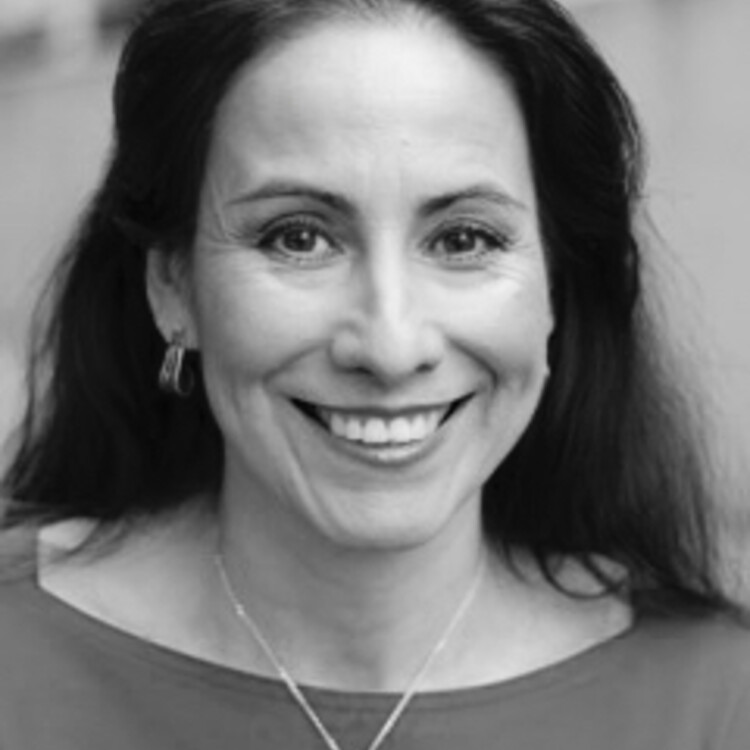
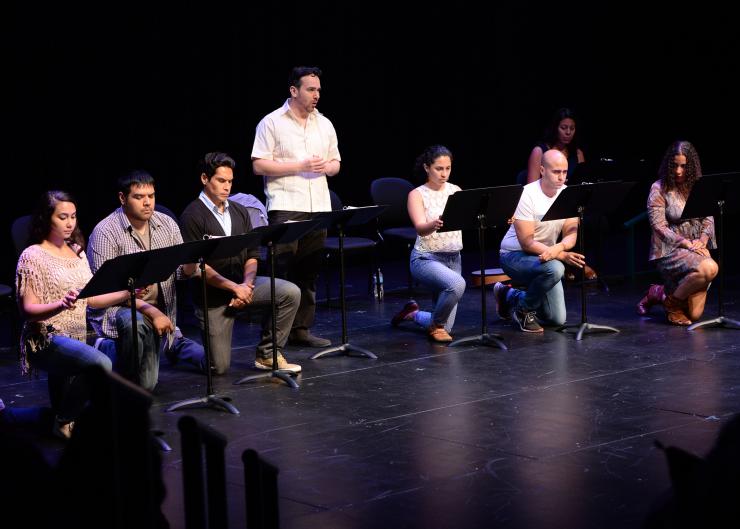
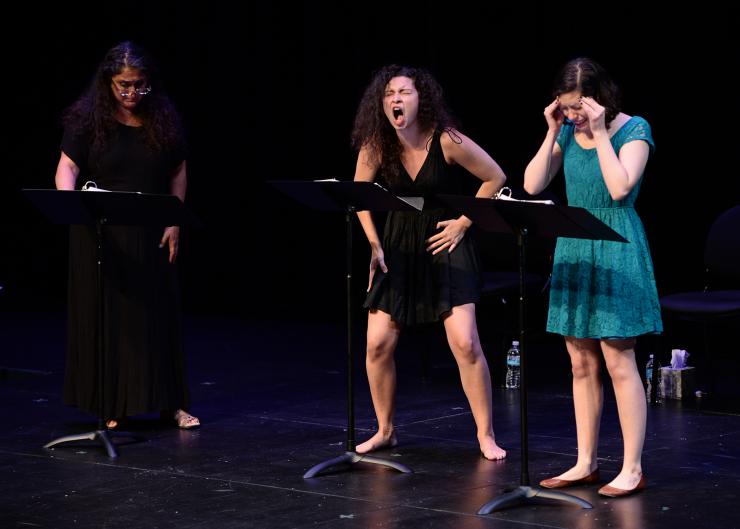
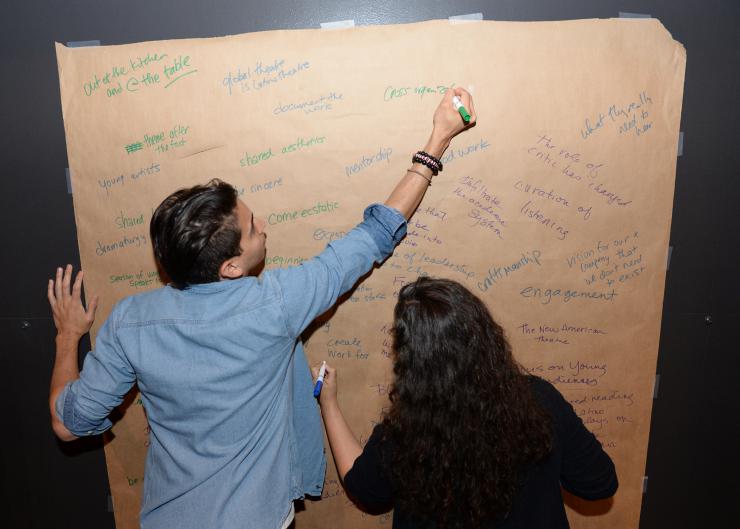
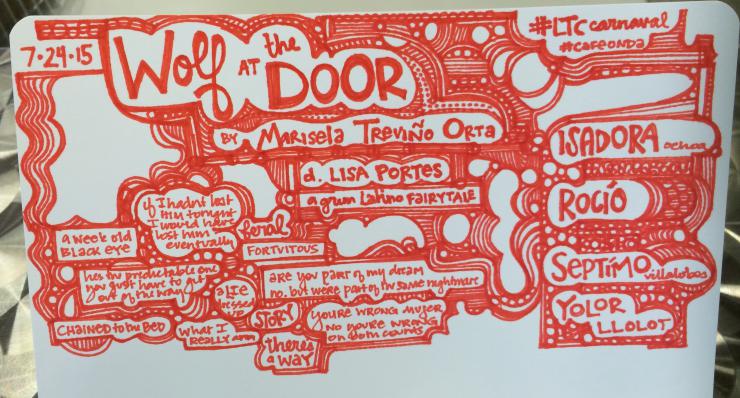
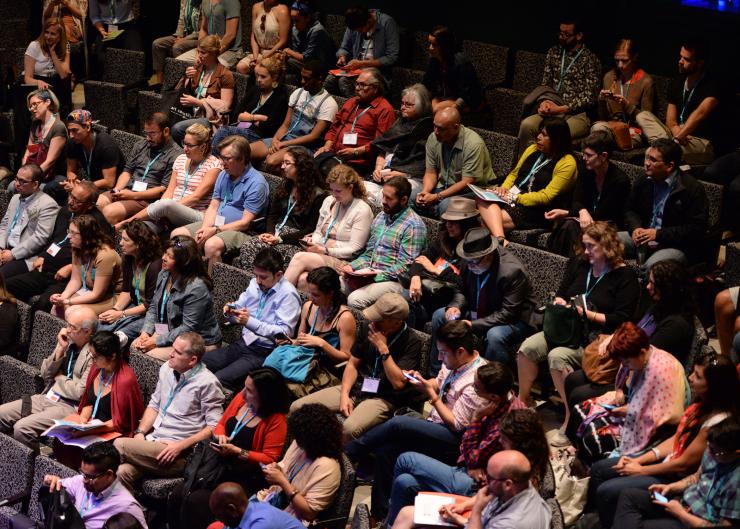
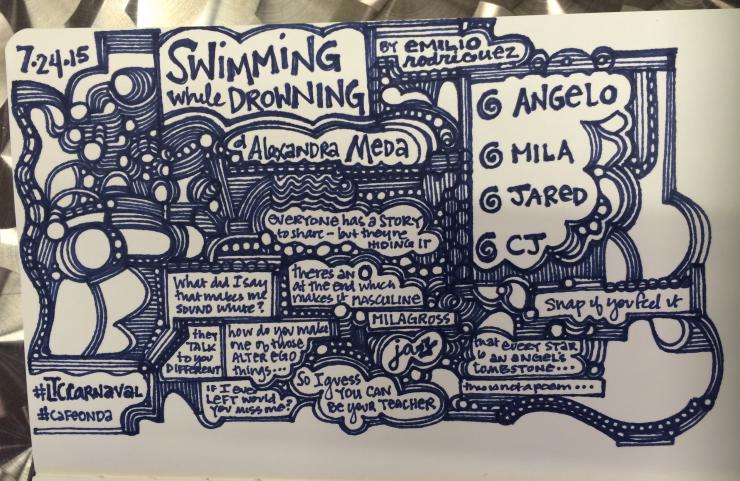
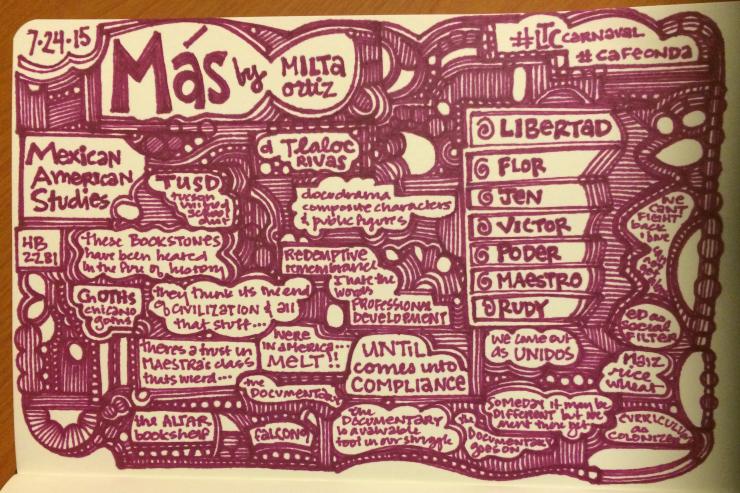
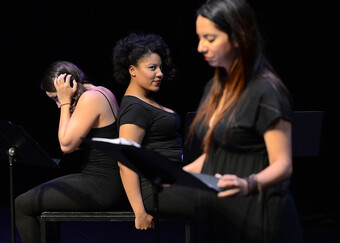

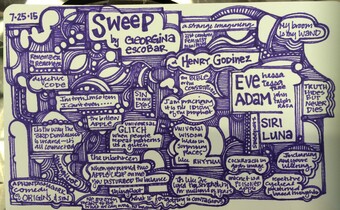

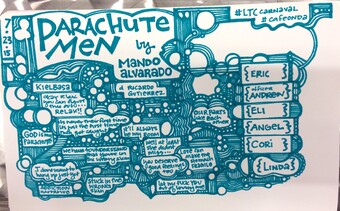

Comments
The article is just the start of the conversation—we want to know what you think about this subject, too! HowlRound is a space for knowledge-sharing, and we welcome spirited, thoughtful, and on-topic dialogue. Find our full comments policy here
I am catching up on my reading. Very grateful for this. Yes to Chicago's actors WOW squared. This reflection takes me back to the deep inspiration of each day. I am going to print this out for my journal - not all moments in life deserve to be re-visited, re-lived in the daydream, but the days of Carnaval and Encuentro 2014 join me as I take a moment to see other worlds in clouds and roots.
I too had long heard that Chicago's actors were stellar, but to see them in the stage and in the rehearsal room was another thing--they are amazing. I was so grateful for the outstanding cast--including the actor who read stage directions. Can't wait for the next opportunity to work with Chicago's very talented acting pool.
Thank you, Luis, Olga and Georgina for assuming the task of writing
about each of the 3 day event. A monumental task, given the density of
the experience. I was very much looking forward to reading these very
personal yet sweeping --oops, there it is SWEEP-- perspectives.
Terrific idea to accompany each day with Brian's doodles! I feel like a
voyeur attempting to peek over his shoulder...
YES to the brave and talented actors of Chicago! Couldn't agree with you more. It just felt like each and every character was fully embodied. Ovations to the Chicago actors, directors and entire crew who brought some truly first class writing to LIFE. No wonder they put us, the audiece, on our feet with joy.
Excellent recap of Day 2! I also was amazed at the quality and depth of the Chicago Latin@ acting pool. I think we also need to recognize the amazing work of the casting director/team. So many of these plays seemed like they were written for the actors and WHEN these shows are produced in Chicago, these actors need the opportunity to fully develop these characters and plays. I was continually blown away by the talent involved and can't wait to get back to Chicago soon. Bien hecho by all involved this weekend!